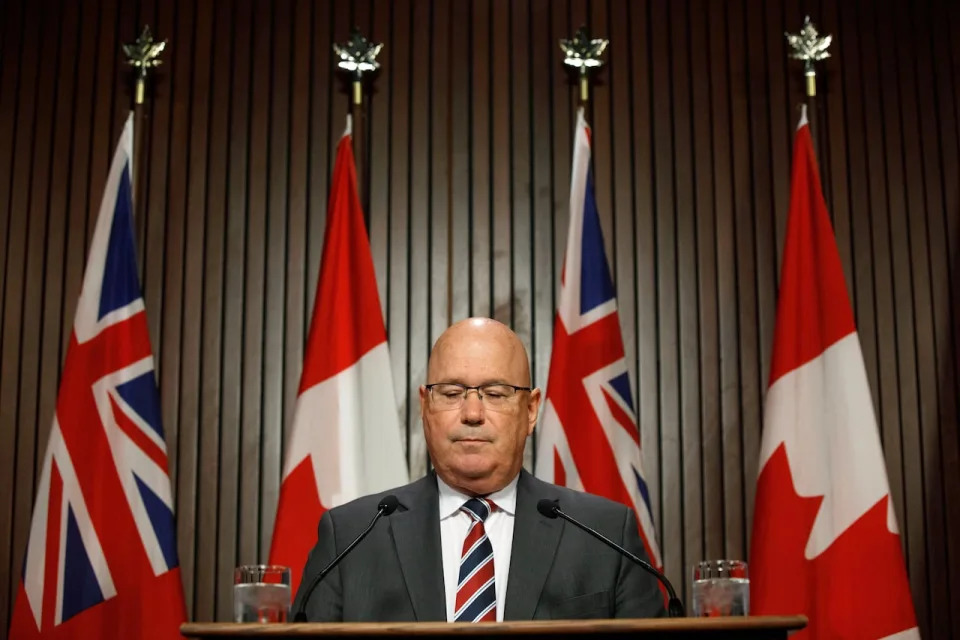Facebook class action lawsuit gets green light to go ahead
CBC
Fri, September 1, 2023

A class action case against Facebook in Quebec can now go ahead. (Dado Ruvic/Reuters - image credit)
A class action lawsuit alleging Facebook allowed advertisers to discriminate is set to go ahead after the Supreme Court of Canada this week refused to hear an appeal filed by the social media giant.
The case, which could include thousands of Quebec residents, will return to Quebec Superior Court to be heard after the Supreme Court of Canada this week refused to give Facebook leave to appeal a ruling by the Quebec Court of Appeal.
"We're very happy," said lawyer Jean-Michel Boudreau, a member of the IMK LLP team spearheading the class action. "I think this is an important case and now we know for sure that the class action can move forward."
Boudreau's law firm has estimated the class action could lead to $100 million in damages.
Lisa Laventure, head of communications for Facebook's parent company Meta Canada, declined to comment on the Supreme Court's decision or the company's next move.
'Microtargeting' ads
The Supreme Court's decision is the latest development in a case that began in 2019 which centres on the practice of allowing advertisers to "microtarget" ads to Facebook users according to their ages or genders.
The application to launch the class action suit, which had been in the works for a while, was filed days after a CBC News investigation revealed that nearly 100 employers — including government departments — posted microtargeted job ads on Facebook that experts said could violate Canadian human rights law.
Under federal and provincial human rights law, employers aren't allowed to restrict who sees job ads based on age, gender, race or religion, unless the restriction is a bona fide occupational requirement or is part of a specific initiative like a student summer job program.
In December 2020, in response to calls from the Canadian Human Rights Commission and the Ontario Human Rights Commission, Facebook announced it would begin enforcing new rules for advertisers in Canada to prohibit discrimination in ads for jobs, housing and credit services.
But while the new rules are supposed to stop advertisers from targeting those kinds of ads based on such criteria as age, gender or postal code, they do not prohibit microtargeting for other kinds of ads.
Court of appeal clears class action
The application for the class action suit was filed in the name of Lyse Beaulieu, who was between 63 and 65 years old when she was searching Facebook and other sites for a job between 2017 and 2019. It was rejected initially by the Quebec Superior Court on the grounds that the definition of the class involved was too broad and could cover "several thousand if not millions of members."
The Quebec Court of Appeal overturned that decision. It said the case raises questions about new forms of discrimination in the digital world, whether social media platforms can be held responsible for third-party ads they post and whether platforms are able to control the ads on their platforms.
The Supreme Court's refusal to hear Facebook's appeal means the Quebec Court of Appeal ruling stands.
Boudreau said the case now returns to Quebec Superior Court, where a new judge will have to be assigned to hear the case. The official notice of the class action likely will be published this autumn, he said.
Under Quebec law, people who fit the description covered by the class action are automatically included in the class action suit unless they opt out.
Unless there's an out-of-court settlement, Boudreau said he expects to wait 3 to 5 years for a day in court.
He said he hopes the court case and the discovery process also will shed light on how the social media giant has been using algorithms to direct ads to Facebook users.
"Everybody is talking about AI," he said. "There is a component of our lawsuit that is about algorithmic discrimination."
The class action could also have an impact on other social media companies, Boudreau said.
Elizabeth Thompson can be reached at Elizabeth.thompson@cbc.ca
CBC
Fri, September 1, 2023

A class action case against Facebook in Quebec can now go ahead. (Dado Ruvic/Reuters - image credit)
A class action lawsuit alleging Facebook allowed advertisers to discriminate is set to go ahead after the Supreme Court of Canada this week refused to hear an appeal filed by the social media giant.
The case, which could include thousands of Quebec residents, will return to Quebec Superior Court to be heard after the Supreme Court of Canada this week refused to give Facebook leave to appeal a ruling by the Quebec Court of Appeal.
"We're very happy," said lawyer Jean-Michel Boudreau, a member of the IMK LLP team spearheading the class action. "I think this is an important case and now we know for sure that the class action can move forward."
Boudreau's law firm has estimated the class action could lead to $100 million in damages.
Lisa Laventure, head of communications for Facebook's parent company Meta Canada, declined to comment on the Supreme Court's decision or the company's next move.
'Microtargeting' ads
The Supreme Court's decision is the latest development in a case that began in 2019 which centres on the practice of allowing advertisers to "microtarget" ads to Facebook users according to their ages or genders.
The application to launch the class action suit, which had been in the works for a while, was filed days after a CBC News investigation revealed that nearly 100 employers — including government departments — posted microtargeted job ads on Facebook that experts said could violate Canadian human rights law.
Under federal and provincial human rights law, employers aren't allowed to restrict who sees job ads based on age, gender, race or religion, unless the restriction is a bona fide occupational requirement or is part of a specific initiative like a student summer job program.
In December 2020, in response to calls from the Canadian Human Rights Commission and the Ontario Human Rights Commission, Facebook announced it would begin enforcing new rules for advertisers in Canada to prohibit discrimination in ads for jobs, housing and credit services.
But while the new rules are supposed to stop advertisers from targeting those kinds of ads based on such criteria as age, gender or postal code, they do not prohibit microtargeting for other kinds of ads.
Court of appeal clears class action
The application for the class action suit was filed in the name of Lyse Beaulieu, who was between 63 and 65 years old when she was searching Facebook and other sites for a job between 2017 and 2019. It was rejected initially by the Quebec Superior Court on the grounds that the definition of the class involved was too broad and could cover "several thousand if not millions of members."
The Quebec Court of Appeal overturned that decision. It said the case raises questions about new forms of discrimination in the digital world, whether social media platforms can be held responsible for third-party ads they post and whether platforms are able to control the ads on their platforms.
The Supreme Court's refusal to hear Facebook's appeal means the Quebec Court of Appeal ruling stands.
Boudreau said the case now returns to Quebec Superior Court, where a new judge will have to be assigned to hear the case. The official notice of the class action likely will be published this autumn, he said.
Under Quebec law, people who fit the description covered by the class action are automatically included in the class action suit unless they opt out.
Unless there's an out-of-court settlement, Boudreau said he expects to wait 3 to 5 years for a day in court.
He said he hopes the court case and the discovery process also will shed light on how the social media giant has been using algorithms to direct ads to Facebook users.
"Everybody is talking about AI," he said. "There is a component of our lawsuit that is about algorithmic discrimination."
The class action could also have an impact on other social media companies, Boudreau said.
Elizabeth Thompson can be reached at Elizabeth.thompson@cbc.ca













